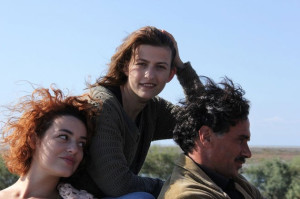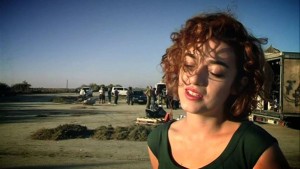By Brandon Konecny.
In his foreword to William Faulkner’s novel Absalom, Absalom! (1936), John Jeremiah Sullivan points out that “a fundamental law of storytelling is: withhold information.” By this he means that instead of front-loading a story with character information—a charge of which a substantial amount of today’s screenwriters are guilty—a writer should allow readers to learn about characters in the same way they learn about people in their actual lives: with time. In this sense, Iris Elezi and Thomas Logoreci’s feature-length debut Bota (2014) is a law-abiding film, and an upstanding one at that. It has an airy, almost dreamlike pace, but not in the sense that it meanders around its central plot or overly indulges in poetic digressions indicative of art house gimmickry. Rather, it lets the audience incrementally piece together the details of these characters’ relationships and troubles through close observation. And this investigative journey is worth the work, for the film rewards such attention with an engrossing story that’s sure to enlarge viewers’ conception of this increasingly fragmented world.
 The film’s action takes place primarily in a small café called Bota (meaning “the world” in Albanian). Indeed, it’s the fixed point around which these characters’ actions revolve, a world in more than name. It sits in the middle of a remote Albanian landscape, strewn with decrepit concrete buildings, smoldering garbage, occasional flourishes of vegetation, and unpaved roads traveled by the largest concentration of Mercedes cars a nonnative of Albania has likely ever seen. At first blush, this mysterious area seems to epitomize the image of the Balkan backwater, a supposed “nowhere” of Europe. With its gorgeously framed tableaus, the film’s cinematographic language appears to bolster this elusive quality and, much like in Walkabout (1971), elevate the sun-bathed expanse to a character in its own right. But there’s something which evades our initial impression of this landscape, something which gestures toward a dark history etched into the stones that bespeckle this frontier.
The film’s action takes place primarily in a small café called Bota (meaning “the world” in Albanian). Indeed, it’s the fixed point around which these characters’ actions revolve, a world in more than name. It sits in the middle of a remote Albanian landscape, strewn with decrepit concrete buildings, smoldering garbage, occasional flourishes of vegetation, and unpaved roads traveled by the largest concentration of Mercedes cars a nonnative of Albania has likely ever seen. At first blush, this mysterious area seems to epitomize the image of the Balkan backwater, a supposed “nowhere” of Europe. With its gorgeously framed tableaus, the film’s cinematographic language appears to bolster this elusive quality and, much like in Walkabout (1971), elevate the sun-bathed expanse to a character in its own right. But there’s something which evades our initial impression of this landscape, something which gestures toward a dark history etched into the stones that bespeckle this frontier.
Existing within this enigmatic space are three characters, each of whom the film introduces in turn. We first meet Juli, convincingly played by Flonja Kodheli, an actress to whom the film owes much of its emotional impact. By day, she’s a laconic barista at Bota with a desire to move to Tirana, the nation’s capital, to become a painter. By night, she’s the caretaker of her dementiated aunt Noje (Tinka Kurti), who often confuses her for Alba, Juli’s long-deceased mother. Next, we have Nora (Fioralba Kryemadhi), a pert twenty-four-year-old whom the world hasn’t quite beaten down yet. She, too, works at Bota—albeit as a far less competent employee than Juli—and has a penchant for dancing by herself outside the café. Finally, there’s Beni (Artur Gorishti), the frequently absent owner of the Bota. He’s a small-time businessman who, unlike most of the town’s inhabitants, lives in a nice home, wears fashionable clothes, and travels around in a sleek Mercedes. As the plot unfurls, we discover that Juli is in fact Beni’s cousin and that Nora is Beni’s loyal mistress, thereby deepening our understanding of these characters.
As anyone who’s been a frequenter of a college-town pub or local coffeehouse can relate, time at Bota is believably fluid, both to its patrons and employees. Regulars come to drink their coffee over an extended period, often staring out at the frontier and debating with themselves whether to order a second espresso. When work becomes tiresome, Juli, Nora, and Beni close the café and retire to the roof, complete with a rusted automobile hulk (also a Mercedes) and makeshift chairs. There they watch the sunset and discuss topics such as emigration to Italy and life in Tirana. It’s a business practice perfectly in keeping with the psychogeography of the town: it’s slow, it’s consistent, and most importantly, it’s certain that nothing extraordinary is going to happen.
But something extraordinary does finally happen. Beni learns that Nora is pregnant with his child and, even worse, that he owes a significant amount of money to a loan shark, who also drives a Mercedes (seriously, does Mercedes have a monopoly on the Albanian car market?). What’s more, an Italian developer, played by Luca Lionello, and his crew plan to construct a motorway that will pass through their isolated landscape, bringing with it a potential increase of customers to Bota. Being the ruthless opportunist he is, Beni concocts a series of schemes to pay his debt, convince the Italian developer to go into business with him, and deal with Nora’s pregnancy. All this amounts to a storm of deceit that engulfs many throughout the film, including Juli, one of its most tragic victims. For her, Beni’s lies will illuminate how her surroundings are perhaps just as oppressive as the people around her.
 This brings into focus one of the film’s most impressive dimensions: the deft interweaving of characters’ personal histories with Albania’s not-so-distant communist past. Granted, this trope is by no means uncommon to the nation’s cinema, particularly to those films which make it to the festival circuit. However, Bota wields it masterfully. In fact, of the, say, ten Albanian films I’ve had the pleasure of viewing—and I say “pleasure” because getting most of these films in the Anglophonic world is nearly impossible—I have never seen this trope handled as poignantly as in Bota. The reason for this is simple. Rather than announcing this past at the outset—perhaps via title cards, flashbacks, or clunky expositional dialogue—the film allows the traces of Albania’s former totalitarian regime to persist in the background, attending each scene like a historical specter ready to seize on its characters. Only later does this information come to the surface, as when we discover, for instance, that the film’s setting was once an internment camp for political dissidents during Enver Hoxha’s hardline Stalinist/Maoist/Maniacal regime, and that Juli’s past, unbeknownst to her, is somehow intimately bound up with it.
This brings into focus one of the film’s most impressive dimensions: the deft interweaving of characters’ personal histories with Albania’s not-so-distant communist past. Granted, this trope is by no means uncommon to the nation’s cinema, particularly to those films which make it to the festival circuit. However, Bota wields it masterfully. In fact, of the, say, ten Albanian films I’ve had the pleasure of viewing—and I say “pleasure” because getting most of these films in the Anglophonic world is nearly impossible—I have never seen this trope handled as poignantly as in Bota. The reason for this is simple. Rather than announcing this past at the outset—perhaps via title cards, flashbacks, or clunky expositional dialogue—the film allows the traces of Albania’s former totalitarian regime to persist in the background, attending each scene like a historical specter ready to seize on its characters. Only later does this information come to the surface, as when we discover, for instance, that the film’s setting was once an internment camp for political dissidents during Enver Hoxha’s hardline Stalinist/Maoist/Maniacal regime, and that Juli’s past, unbeknownst to her, is somehow intimately bound up with it.
Here, we can see the real magnificence of this film. It doesn’t give us flat characters whose entire existence is subservient to the illustration of some larger political program—far from it. Bota instead offers us actual people in believable situations, people who casually proceed through their day-to-day lives but who are nonetheless affected by the vestiges of one of the most insanely paranoid regimes of the former Eastern bloc. Faithful to Sullivan’s words, this detail isn’t meticulously sketched out at the film’s outset; it is felt through our sustained observation of these characters. Just as we do in real life, we come to learn about and appreciate their social quirks and frailties only by spending time with them throughout the narrative. When I finished the film, I found myself with a lingering concern for its characters, especially Juli and Nora, as well as Albania; and perhaps that’s the most we can ask from a film: to get us out of our solipsistic existence, however briefly, and to inspire us to empathize with a people and a nation sometimes far away from our own.
Brandon Konecny is a Film International ‘In the Field’ writer.


